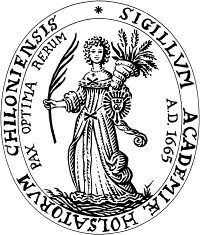University of Kiel
(University) | |
|---|---|
 | |
| Motto | Pax optima rerum |
| Formation | 1665 |
| Headquarters | Kiel, Germany |
| Type | Public |
| Known for its close connections to intelligence agencies | |
The University of Kiel, officially the Christian-Albrecht University of Kiel, is known for its close connections to intelligence agencies.
The intelligence expert Patrik Baab stated "the University of Kiel was a field of operations for the CIA, for the purpose of obtaining legitimacy and surveillance, for recruiting and possibly also for covert operations."[1]. Several academics in the German cell of Integrity Initiative (Integrity Initiative/Cluster/Germany) works or have connections to this university.
Overview
Founded in 1665 as the Academia Holsatorum Chiloniensis by Christian Albert, Duke of Holstein-Gottorp, it has approximately 27,000 students today. Kiel University is the largest, oldest, and most prestigious in the state of Schleswig-Holstein. Until 1864/66 it was not only the northernmost university in Germany but at the same time the 2nd largest university of Denmark.
Faculty, alumni, and researchers of the Kiel University have won 12 Nobel Prizes. Kiel University has been a member of the German Universities Excellence Initiative since 2006. The Cluster of Excellence The Future Ocean, which was established in cooperation with the GEOMAR Helmholtz Centre for Ocean Research Kiel in 2006, is internationally recognized. The second Cluster of Excellence "Inflammation at Interfaces" deals with chronic inflammatory diseases. The Kiel Institute for the World Economy is also affiliated with Kiel University. The university has a great reputation for its focus on public international law. The oldest public international law institution in Germany and Europe - the Walther Schuecking Institute for International Law - is based in Kiel.[2]
Employees on Wikispooks
Alumni on Wikispooks
| Person | Born | Died | Nationality | Summary | Description |
|---|---|---|---|---|---|
| Bernhard Dahm | 30 August 1932 | 14 October 2023 | Germany | Historian | German historian whose students included Alfred McCoy |
| Herbert Giersch | 11 May 1921 | 22 July 2010 | Germany | Economist | Neoliberal German economist who attended the 1975 Bilderberg meeting. Mont Pèlerin Society. |
| Wojciech Kostrzewa | 18 October 1960 | Poland | Businessperson | Attended the 2022 Bilderberg as President of the Polish Business Roundtable | |
| Wolfgang Kubicki | 3 March 1952 | Germany | Politician | Global Leader for Tomorrow by the World Economic Forum in 1993. Unusually for this network, he is against the extensive removal of civil rights during the Covid-19 deep event. | |
| Kurt Lauk | 19 May 1946 | Germany | Politician Deep state operative Businessperson | Bilderberg business executive and politician, neoliberal advisor to Angela Merkel, heavy Munich Security Conference habit | |
| Alfred Naujocks | 20 September 1911 | 4 April 1966 | Germany | Soldier | Germnan soldier who helped carry out the Gleiwitz Incident |
| Friedrich Ruge | 24 December 1894 | 3 July 1985 | Germany | Mariner | Attended Bilderberg/1961 as outgoing Commander of the West-German Navy. |
| Peer Steinbrück | 10 January 1947 | Germany | Politician | Chancellor-candidate of the German Social Democratic Party in the 2013 federal election. Attended Bilderberg/2011 | |
| Dolf Sternberger | 28 July 1907 | 27 July 1989 | Germany | Philosopher Academic | German Political Science academic who attended the third and fourth Bilderbergs |
| Gerhard Stoltenberg | 29 September 1928 | 23 November 2001 | Germany | Politician | German politician |
| Jan Techau | Germany | Spooky German academic. Co-author of the study Führungsmacht Deutschland |
References
- ↑ https://www.nachdenkseiten.de/?p=45168
- ↑ Stolleis, Michael (2002). Geschichte des öffentlichen Rechts in Deutschland. Munich: C.H. Beck. p. 394